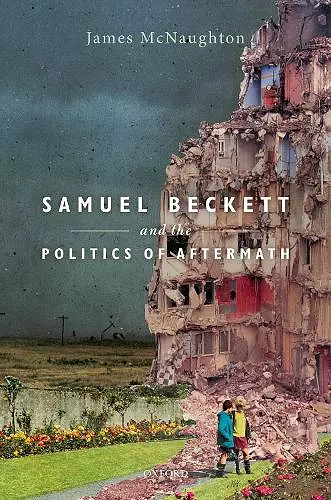Samuel Beckett and the Politics of Aftermath
Format:Hardback
Publisher:Oxford University Press
Published:21st Aug '18
Currently unavailable, and unfortunately no date known when it will be back

Samuel Beckett and the Politics of Aftermath explores Beckett's literary responses to the political maelstroms of his formative and middle years: the Irish civil war and the crisis of commitment in 1930s Europe, the rise of fascism and the atrocities of World War II. Archive yields a Beckett who monitored propaganda in speeches and newspapers, and whose creative work engages with specific political strategies, rhetoric, and events. Finally, Beckett's political aesthetic sharpens into focus. Deep within form, Beckett models ominous historical developments as surely as he satirizes artistic and philosophical interpretations that overlook them. He burdens aesthetic production with guilt: imagination and language, theater and narrative, all parallel political techniques. Beckett comically embodies conservative religious and political doctrines; he plays Irish colonial history against contemporary European horrors; he examines aesthetic complicity in effecting atrocity and covering it up. This book offers insightful, original, and vivid readings of Beckett's work up to Three Novels and Endgame.
More than any other scholar writing today, McNaughton changes the way we read Beckett. This book matters both for what it gives us, and what it deprives us of. After McNaughton, there can be no denying that Beckett worked consciously and consistently at the intersection of ethics, aesthetics and politics. In six extraordinary chapters, Samuel Beckett and the Politics of Aftermath traces that commitment from the early writings unto the great works of Beckett's maturity. In doing so, it provides the best account we have to date of Beckett's aesthetic practice, as well as providing stunning new readings of the artworks from which it emerged. With a flair uniquely his own, McNaughton balances the demands of close reading with an ability to illuminate local detail in historical and theoretical context. For all these reasons, this is an indispensable book. It is also a joy to read. You will learn something from every page. * Seán Kennedy, Saint Mary's University *
Rescuing Beckett from the existentialist void, James McNaughton shows how the language and formal structures of his texts engage actively and consequentially with some of the major political challenges of his time: the establishment of the Irish Free State, the rise of Nazism in Germany, and the effects of the second world war. McNaughton tells his story with wit, verve, and an urgency that compels us to recognize Beckett as an emphatically political writer who asks us to think long and hard about the implications of our own interpretative choices. A model of critical acumen and assiduous research, Samuel Beckett and the Politics of Aftermath is an indispensable book for Beckett specialists and for scholars and students of the wider field of aesthetic modernism. * Adam Parkes, University of Georgia *
McNaughton's unfailingly clear-eyed, immensely suggestive book is founded on a recognition that Beckett's early and mid-period work is a protracted meditation, not only on the intractable truth, but our necessary and continuing evasions of it, and that the result is a pervasively and irreducibly ironical aesthetic. McNaughton drastically rethinks many of the most established emphases in Beckett criticism. But the book's major achievement is to show in compelling detail how far the Beckettian will to abstraction which has determined so many accounts of him is in fact itself deliberately, ironically mined, punctuated and nuanced by the traces of political history. No-one has better glossed Beckett's extraordinary -- and extraordinarily subtle -- political intelligence, sensitivity and scruple. * Andrew Gibson, University of London *
Samuel Beckett and the Politics of Aftermath presents a historicist and materialist analysis of Samuel Beckett's work. Building on the historicist turn in modernist studies, as well as Irish studies and postcolonial paradigms, it develops new terms through which we can understand Beckett's political aesthetic. * John Greaney, Goethe University Frankfurt *
ISBN: 9780198822547
Dimensions: 242mm x 163mm x 19mm
Weight: 522g
238 pages